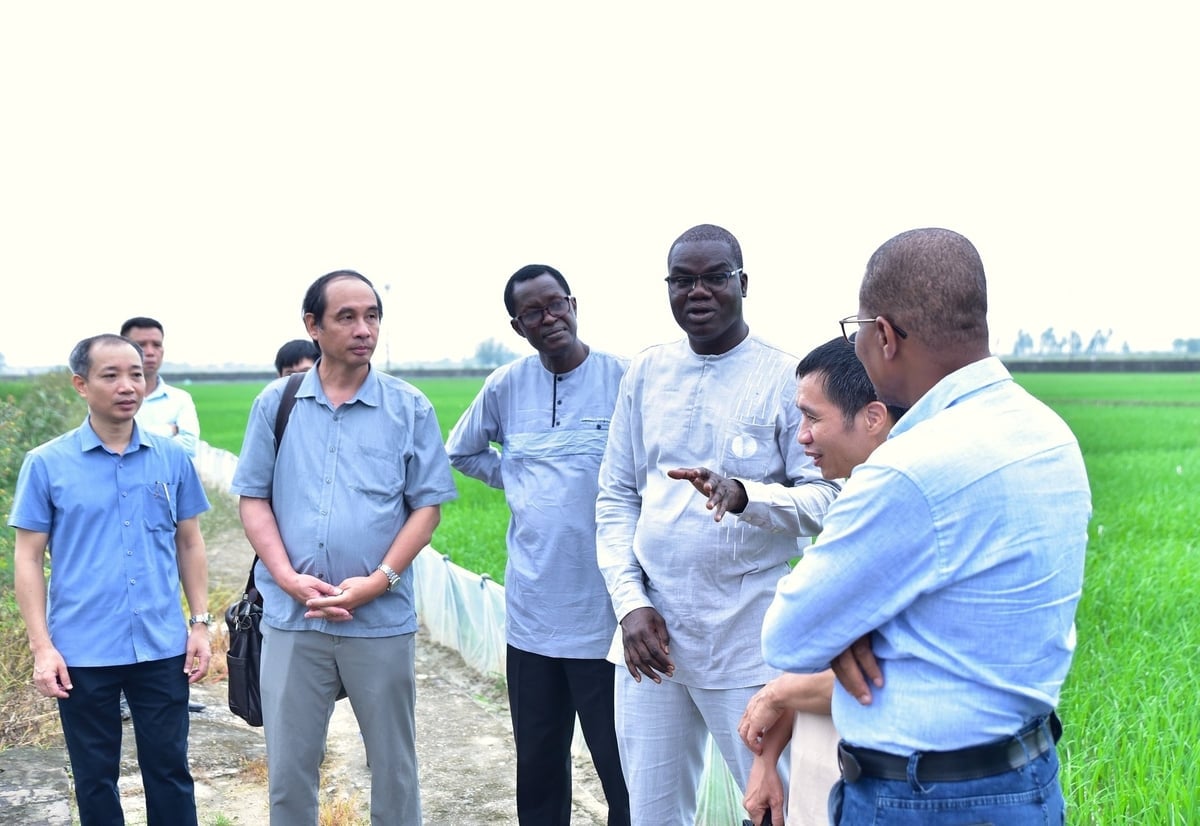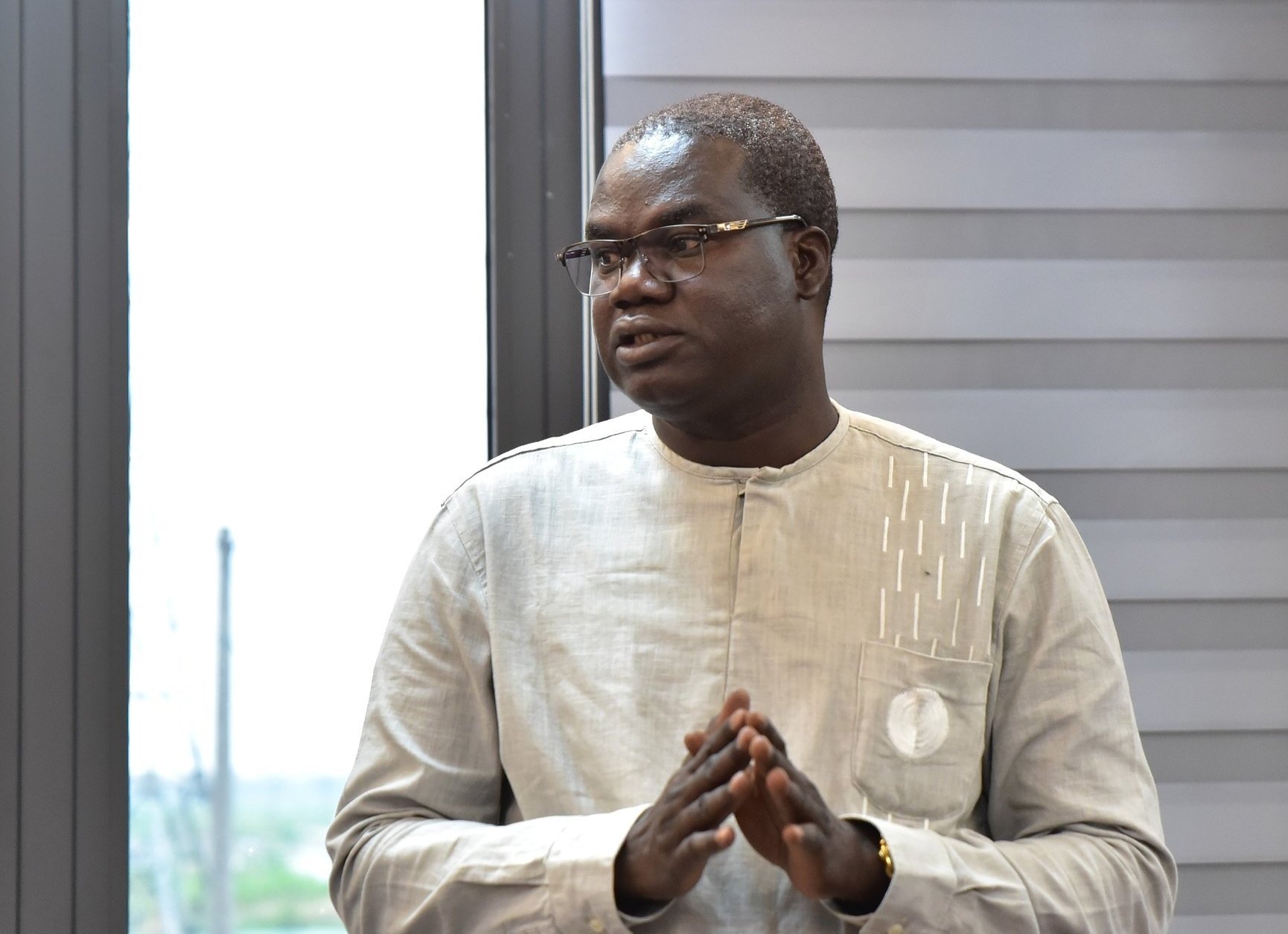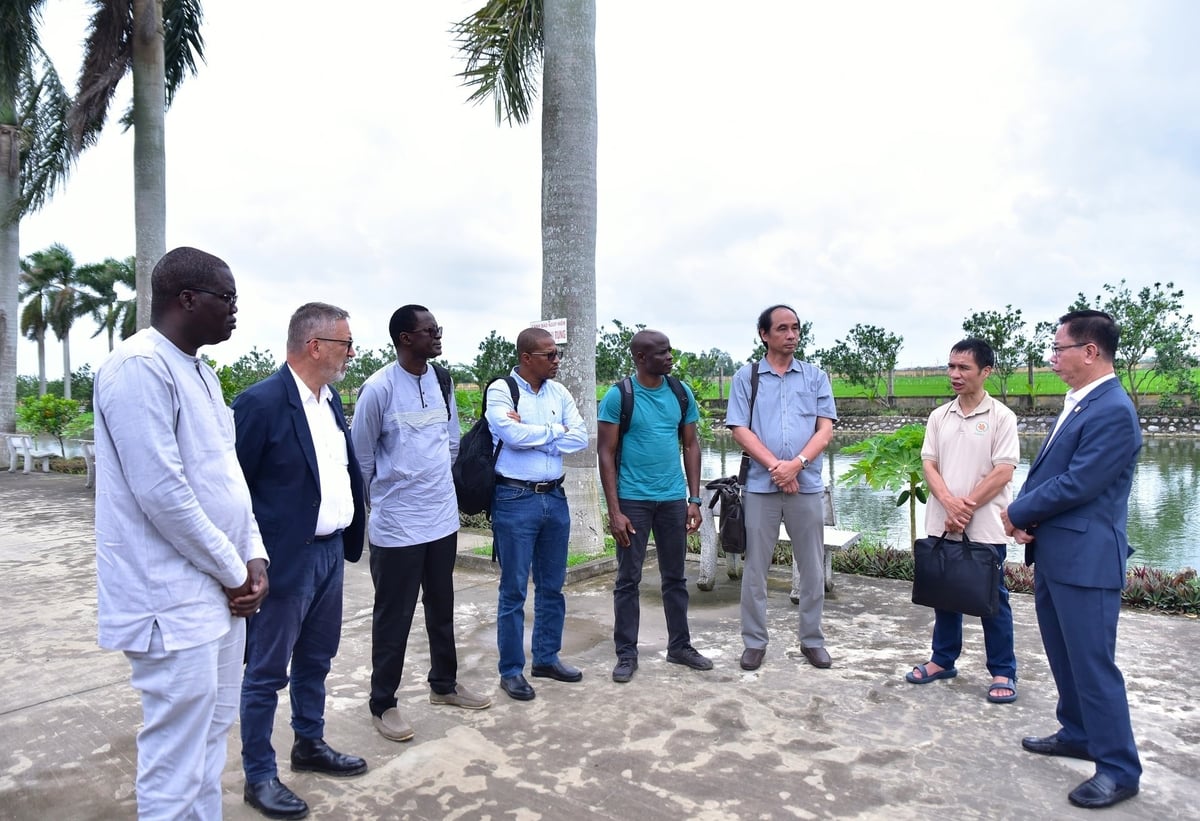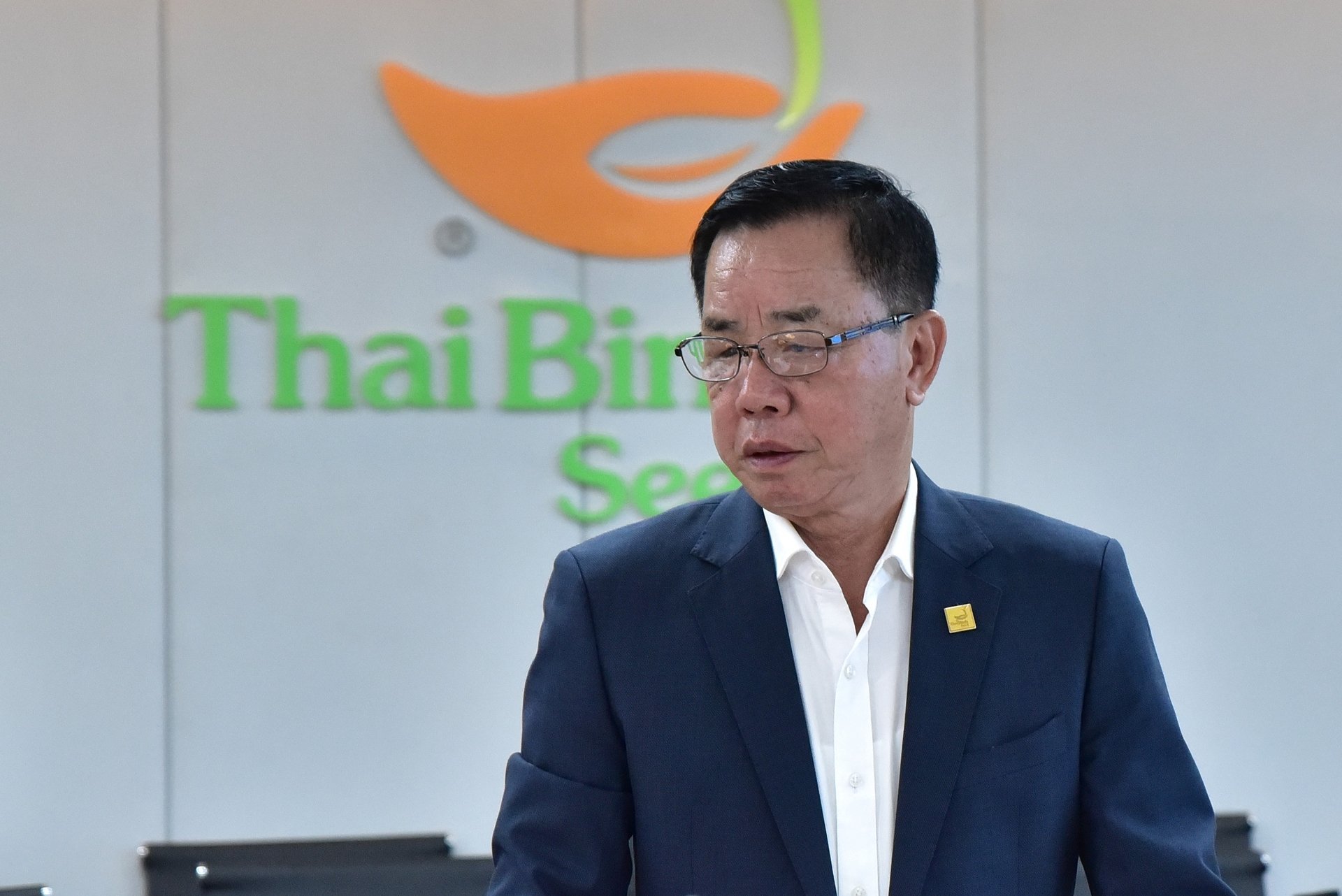December 5, 2025 | 17:12 GMT +7
December 5, 2025 | 17:12 GMT +7
Hotline: 0913.378.918
December 5, 2025 | 17:12 GMT +7
Hotline: 0913.378.918
On August 21, within the framework of a working visit to Vietnam, a delegation of Senegalese agricultural experts held meetings with the Field Crops Research Institute (FCRI) and ThaiBinh Seed JT Company. The visit was part of a project funded by the French Government through the French Agricultural Research Centre for International Development (CIRAD), aimed at promoting agroecological cooperation between Vietnam and Senegal.

Senegalese agricultural scientists visit the fields at the Field Crops Research Institute. Photo: Kieu Chi.
During the field survey, Dr. Madiama Cissé - Scientific Director of the Senegalese Agricultural Research Institute (ISRA) - expressed interest in the process from breeding, testing, to agricultural extension, considering it the key to technology transfer and application.
He stated: "We are eager to learn from Vietnam’s experience in developing rice varieties that are drought-tolerant, pest-resistant, and adaptable to Senegal’s ecological conditions. If transferred, we expect these rice varieties to achieve yields similar to those in Vietnam.” Rice yields in Senegal currently reach 5-6 tons per hectare.
According to Dr. Pham Thien Thanh, Deputy Director of FCRI, Vietnam has significantly shortened the time required for new variety approval. This achievement has been made possible through the combination of scientific research and the national variety testing policy, which allows new varieties to be quickly brought into production and transferred to farmers via the agricultural extension system.
"Vietnam exercises very strict control over seed quality. The evaluation criteria and testing procedures are clearly stipulated in the Law on Crop Production in 2008," Dr. Thanh emphasized. This is also an aspect that Senegal is eager to study and apply in practice.

Dr. Waly Diouf, PNAR Coordinator, sees many opportunities for collaboration in breeding varieties adapted to drought or sudden rainfall conditions in Senegal. Photo: Kieu Chi.
During the discussion, Dr. Waly Diouf - Coordinator of the National Program for Rice Self-Sufficiency (PNAR) - also inquired about Vietnam’s experience in coping with climate change and pest diseases. Dr. Thanh said: "The improvement of new varieties always has to keep pace with the speed of climate change. We manage pests by selecting disease-resistant varieties rather than overusing pesticides."
Over the past ten years, FCRI has researched, bred, and received approval for 105 new crop varieties, including 50 rice varieties. Thanks to modern biotechnology, many of these varieties are of high quality and notably disease-resistant, such as HDT10, BD15-02 (resistant to rice blast), and BT7KBL-02 (resistant to bacterial leaf blight).
Mr. Duong Xuan Tu, Acting Deputy Director, emphasized that the Institute also focuses on breeding varieties suitable for specific ecological regions: in the North, developing flood-tolerant, drought-tolerant, and pest-resistant varieties; in the Mekong Delta, focusing on salt-tolerant varieties; and in the Northern mountainous region, selecting varieties that can withstand short-term flooding.
In practice, Senegal still imports a large amount of rice, including from Vietnam. Therefore, collaboration in transferring new varieties and cultivation techniques will help this West African country improve domestic production and achieve greater food self-sufficiency.
Later that afternoon, the Senegalese delegation met with ThaiBinh Seed to discuss potential cooperation and learn from Vietnam’s experience in production organization, intellectual property, technology use, and strengthening collaboration with research networks.

Mr. Tran Manh Bao, Chairman of the Board of ThaiBinh Seed (far right), welcomes the Senegalese delegation. Photo: Kieu Chi.
Mr. Tran Manh Bao, Chairman of ThaiBinh Seed, introduced: "The Vietnamese government has issued many strategic policies for crop development, creating favorable conditions for businesses to collaborate in research and production applications. When there is a policy of management innovation, enterprises must be courageous and proactive in seizing opportunities, overcoming barriers in order to promote the transformation process."
In Senegal, very few enterprises are able to produce rice seeds systematically like in Vietnam. "Rice is our top priority, and I highly appreciate the role of ThaiBinh Seed in seed production and in experience of business model transformation. The company’s modern equipment system also left a deep impression on me," Dr. Waly shared.
Mr. Bao also affirmed that ThaiBinh Seed is always ready to share experience and cooperate in technology transfer with Senegal, at the request of Dr. Waly Diouf.

Mr. Tran Manh Bao emphasized the coordination between government policy and the private sector to ensure a stable supply of seeds for farmers. Photo: Kieu Chi.
Beyond rice, both sides also exchanged experiences in developing peanut and legume varieties and managing rice by-products. According to Mr. Bao: "Breeding varieties adapted to climate change is both a goal and a requirement of Vietnam’s crop breeding sector in general, and of our company in particular. These include flood-tolerant, salt-tolerant, lodging-resistant, and pest-resistant crops."
It is clear that Senegal is focusing on systematically developing its seed sector. Senegal has issued multiple policies to promote the private economy, but still faces challenges in agricultural extension, and private enterprises participating in seed commercialization remain limited.
The field visit has opened up many new opportunities for cooperation in variety breeding, crop management, and agricultural development in the new context. With its research experience, Vietnam can support Senegal in improving rice yields, adapting to climate change, and reducing reliance on imports.
Translated by Kieu Chi

(VAN) As of 2025, the ASEAN region has a total of 69 ASEAN Heritage Parks recognized across its 10 member states. Among them, Viet Nam contributes 15 ASEAN Heritage Parks.

(VAN) Yok Don National Park has high biodiversity with numerous endemic plant and animal species, and it is also the only dipterocarp forest ecosystem conservation area in Viet Nam.

(VAN) Viet Nam and Brunei signed two important MOUs on fisheries and IUU, expanding cooperation in agriculture, the environment, and Halal exports, aiming to substantively implement joint projects.

(VAN) The Viet Nam Coconut Association worked with the International Finance Corporation (IFC) and businesses to promote the supply chain, enhance competitiveness, and develop the coconut industry sustainably.
![Hue aims for Net Zero: [2] Pioneering low-emission tourism](https://t.ex-cdn.com/nongnghiepmoitruong.vn/608w/files/huytd/2025/12/04/0633-dulichzero-4-095634_236-161125.jpg)
(VAN) The ancient capital of Hue has developed Net Zero tourism products and models, aiming to reduce carbon emissions and pioneer the establishment of Viet Nam's green tourism destination.

(VAN) C.P. Viet Nam has announced the successful completion of its goal to plant 1.5 million trees during the 2021-2025 period, a key milestone within company's long-term ESG strategy and its roadmap for emission reduction.

(VAN) This is an initiative of MAE aimed at creating a unified coordination mechanism to implement agricultural cooperation programs with developing countries.